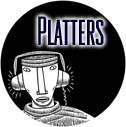
Comment
on this story
|
 |

An ancient instrument, a veteran trio, and the other Kenny G.
Orchestre National de Jazz
Charmediterranéen (ECM)
There's something inadvertently timely to this recently released 2001 recording. Didier Levallet, former leader of the Orchestre National de Jazz once remarked, "Americans still have trouble appreciating the music they invented and sent out into the world... imagine how much trouble they have accepting French jazz." Circumstances between French and Americans have arguably not improved, what with American jazz saxophonist Steve Lacy being recently ousted from his 30-year Parisian redoubt, not to mention Franco-American foreign policy differences.
Enter the oud, an unusual, although again oddly timely, guest at this big band's table. Of Mesopotamian origin (c. 1500 BC), the five-stringed oud is the precursor of the lute, neither of which would be expected in the loud company of such brass and "batterie" (French for percussion, an apt term in this context). But thanks to electronic amplification, ingenious arrangements, and the imagination of Anouar Brahem, Charmediterranéen is delightfully enhanced by the oud's presence.
Arrangements herein, all originals, are expansive and varied, with several being multi-part suites, developing from anthem-like obeisance to percussion-propelled workouts. Most notable is the extended title cut ("charms of the Mediterranean"), commencing from a duet between Brahem's oud and Huby's violin, and over 15 minutes evolving into a driving vehicle for synthesized trumpet and tenor sax soloing. More contemplative are two versions of present-ONJ director Damiani's "Argentiera," a hymn-like melody treated to the improvised attentions of oud, sax, and violin.
While not about easy associations and facile forms, Charmediterranéen pleasingly presents the diverse colors unique to big band arrangements, shaded with Middle Eastern influences.
—Jonathan B. Frey
Keith Jarrett/Gary Peacock/Jack DeJohnette
Up For It (ECM)
Twenty years and 16 releases in, the art of this particular piano trio continues. After the free-formulae of their last two albums, Up For It returns Keith & Co. to the standards repertoire, and what a familiar selection it is: only two of the tunes ("Scrapple From the Apple" and "Two Degrees East") are new to this group's recorded history. It's fair to admit there are no surprises herein, no revelations, no expansion of what has come before. But if nothing else, one can admire the consistency.
Recorded live at the 2002 Antibes jazz fest, the music itself remains true to Jarrett's ongoing idea of non-possessiveness. Rather than update or personally stamp the material, the trio shuns arrangements (and setlists), tapping an organic flow from note one. And it is this flow that renews the appeal of moratorium-begging songs like "My Funny Valentine" and "Someday My Prince Will Come." Jarrett still finds much reward in standard chord changes ("Scrapple," "If I Were a Bell"), as his joyous, eloquent solos sing over Peacock's nimble bass counterpoint. DeJohnette, as usual, displays impeccable taste and touch; this group has long spurred much of his finest drumming. A head of steam builds steadily throughout the concert, culminating in the funky title-track vamp that emerges at the end of "Autumn Leaves."
The idiomatic genetics of bop and blues are embedded deep in the workings of all three players, while their collective phraseology is so natural and original (and innocent, after all those years of experience) that neither the traditionalist nor modernist tags apply. In other words, these guys know better than to be clever. Improvisational honesty is all they offer, and the results are still worth hearing.
—Chris Mitchell
Kenny Garrett
Standard of Language (Warner Bros.)
The disc appears to start innocently enough. What could be more charming than the Cole Porter standard "What is This Thing Called Love?" Make no mistake, it isn't to be. This ordinarily quiet four-minute inquiry into a universal mystery is reconfigured into an extended, 300-plus beats-per-minute, Job-histrionic bellowing of the question. Not entirely what Porter expected when he wrote love "quickened my humdrum heart."
That inquisition declared complete, a loopy original, "Kurita Sensei," featuring Coltranesque soprano lines and declarative piano block chords, follows. Which is in turn followed by "XYZ," a fierce take-no-prisoners bop head, bringing to a close the first 20 minutes of this, the other Kenny G's, latest.
It's a baldly belligerent launch, with Garrett's alto and soprano soaring through the changes, blazing, chirping, yowling—even Charnett Moffett's brief arco bass solo on "XYZ" threatens. It's as if Garrett and company aspire to erase all memory of their previous release, the light-hearted Marcus Miller production appropriately entitled Happy People.
That memory all but erased, "Native Tongue" follows the opening triumvirate with disarming innocence, the melody frankly stated, agendaless and lyrical. Is this a different band altogether? It is indeed a welcome interval, and the only real contrast other than one ballad, aptly titled "Just a Second to Catch My Breath," in this otherwise driving set of nearly all originals.
Which isn't to say Standard of Language isn't enjoyable. Quite the contrary, it's one hell of a ride, with Garrett in characteristic form and his quartet equally so, delivering sustained energy to complex and dramatic material.
—Jonathan B. Frey

June 5, 2003 * Vol. 13, No. 23
© 2003 Metro Pulse
|